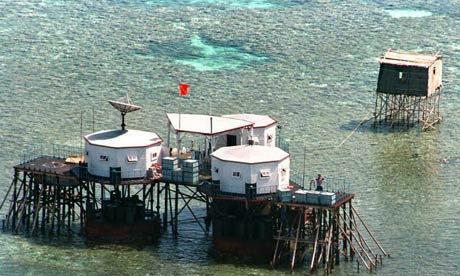
South China Sea row intensifies as China expands territorial claims in regions such as Spratley Islands. Photograph: Romeo Gacad/AFP/Getty Images

China's state-run media has lambasted the United States over its intervention in the South China Sea row, highlighting the alarming escalation of a long-running dispute.
Furious commentaries ordered Washington to "shut up" and accused it of "fanning the flames and provoking division" in the region. The foreign ministry in Beijing called in a senior US diplomat at the weekend over the State Department comments.
Analysts fear the South China Sea has become a major potential flashpoint, as tensions have risen sharply between China – which claims almost all the sea – and Vietnam and the Philippines. Brunei, Taiwan and Malaysia also lay claim to parts of the sea, which contains valuable energy reserves and fisheries and sees an estimated $5 trillion of cargo – half the world's shipping tonnage – pass through its sea lanes annually.
"While the likelihood of major conflict remains low, all of the trends are in the wrong direction, and prospects of resolution are diminishing," theInternational Crisis Group warned in a recent report on the six-party dispute.
Beijing's most recent moves include offering oil and gas exploration blocks for bidding and establishing a new city, Sansha, which boasts at most a few thousand residents and 5 square miles (13 square kilometres) of land spread over several tiny islands – yet lays claim to 772,000 square miles (2 million square kilometres) of sea and its own military garrison.
It prompted the US to publicly reenter the row, with a statement expressing concern at the growing tensions and singling out Beijing's role. The city and garrison "run counter to collaborative diplomatic efforts to resolve differences and risk further escalating tensions in the region," said Patrick Ventrell, acting deputy spokesperson at the State Department.
Beijing responded by calling in the US deputy chief of mission and state media ran a spate of hostile pieces. "We are entirely entitled to shout at the United States, 'Shut up'. How can meddling by other countries be tolerated in matters that are within the scope of Chinese sovereignty?" asked a commentary in the overseas edition of the People's Daily, the official Communist party newspaper.
The domestic version accused Washington of "fanning the flames and provoking division" in the region.
State media say Beijing's moves are a response to the actions of Manila and Hanoi, such as a new law requiring all foreign ships passing through the disputed waters to notify Vietnamese authorities.
In Chinese eyes, it is – as deputy foreign minister Cui Tiankai recently described it – a "victim", not the instigator.
Though its far smaller neighbours bristle at such a description, the new ICG report notes: "China is not stoking tensions on its own. South East Asian claimants ... are now more forcefully defending their claims – and enlisting outside allies – with considerable energy."
Shading the row is concern about the Obama administration's refocusing of foreign policy in a "pivot to Asia". The US says it has no territorial ambitions in the Sea and no position on the competing claims to land features, but has a national interest in freedom of navigation and maintaining peace and stability.
But Chinese hawks warn of an attempt to encircle and contain China while others argue that, at a minimum, its rivals are exploiting the US shift.
A Xinhua commentary this weekend accused the US of double-dealing and urged Washington to show it was not seeking "to clip China's wings and shore up the United States' cracking pedestal in the Asia-Pacific".
In a speech quoted by the Global Times, Zhou Fangyin of the Chinese Academy of Social Sciences noted: "Countries with territorial disputes with China believe that the costs and risks of provoking China have largely dropped ... China's rapid rise may also make [them] realize that their chances of reaping and consolidating benefits by encroaching upon Chinese territories would be smaller in the future."
In any case, argues Rory Medcalf of Australia's Lowy Institute, "It has become academic to ask who started it ... What we see now is an action-reaction cycle."
The multitude of Chinese agencies involved has stoked tensions, the ICG has argued, with poor coordination and some actors seeing it as a way to increase their power and budget.
Increasing militarisation of the dispute makes it harder to resolve skirmishes, but could also raise the threshold for armed conflict, it noted.
"More immediate conflict risks lie in the growing number of law enforcement and paramilitary vessels playing an increasing role in disputed territories without a clear legal framework", it added.
Domestic nationalism in other claimant countries adds to the difficulties.
No one wants military conflict, not only because of the inevitable disruption of trade. The smaller countries would have to take on mighty China, while such a conflict "would undermine [Beijing's] peaceful rise thesis, cause irreparable damage to its image and foreign policy in Asia and push other countries far closer to the US.
Clearly none of that is in China's interests," said Ian Storey, of the Institute of South East Asian Studies in Singapore.
Yet should it come to an exchange of fire, even the US could feel compelled to become involved – with great reluctance – to defend its credibility as an ally not only to the Philippines but countries across Asia, argued Medcalf.
Analysts see little hope of resolving the dispute and say the best-case scenario is now the agreement of measures to handle clashes.
"I don't think any of the claimants have any good options. They have all painted themselves into a corner," said Storey.

This comment has been removed by the author.
ReplyDelete